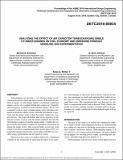| dc.contributor.author | Buchman, Michael R. | |
| dc.contributor.author | Johnson, William Brett | |
| dc.contributor.author | Winter, Amos G. | |
| dc.date.accessioned | 2019-03-11T15:49:26Z | |
| dc.date.available | 2019-03-11T15:49:26Z | |
| dc.date.issued | 2018-08 | |
| dc.identifier.isbn | 978-0-7918-5178-4 | |
| dc.identifier.uri | http://hdl.handle.net/1721.1/120858 | |
| dc.description.abstract | Turbocharging can provide a cost effective means for increasing the power output and fuel economy of an internal combustion engine. A turbocharger added to an internal combustion engine consists of a coupled turbine and compressor. Currently, turbocharging is common in multi-cylinder engines, but it is not commonly used on single-cylinder engines due to the phase mismatch between the exhaust stroke (when the turbocharger is powered) and the intake stroke (when the engine intakes the compressed air). The proposed method adds an air capacitor, an additional volume in series with the intake manifold, between the turbocharger compressor and the engine intake, to buffer the output from the turbocharger compressor and deliver pressurized air during the intake stroke. This research builds on previous work where it was shown experimentally that a power gain of 29% was achievable and that analytically a power gain of 40-60% was possible using a turbocharger and air capacitor system. The goal of this study is to further analyze the commercial viability of this technology by analyzing the effect of air capacitor turbocharging on emissions, fuel economy, and power density. An experiment was built and conducted that looked at how air capacitor sizing affected emissions, fuel economy, and the equivalence ratio. The experimental data was then used to calibrate a computational model built in Ricardo Wave. Finally this model was used to evaluate strategies to further improve the performance of a single cylinder diesel turbocharged engine with an air capacitor. | en_US |
| dc.description.sponsorship | Massachusetts Institute of Technology. Tata Center for Technology and Design | en_US |
| dc.description.sponsorship | National Science Foundation (U.S.). Graduate Research Fellowship (Grant No. 1122374) | en_US |
| dc.publisher | American Society of Mechanical Engineers | en_US |
| dc.relation.isversionof | http://dx.doi.org/10.1115/DETC2018-85934 | en_US |
| dc.rights | Article is made available in accordance with the publisher's policy and may be subject to US copyright law. Please refer to the publisher's site for terms of use. | en_US |
| dc.source | ASME | en_US |
| dc.title | Analyzing the Effect of Air Capacitor Turbocharging Single Cylinder Engines on Fuel Economy and Emissions Through Modeling and Experimentation | en_US |
| dc.type | Article | en_US |
| dc.identifier.citation | Buchman, Michael R., W. Brett Johnson, and Amos G. Winter. “Analyzing the Effect of Air Capacitor Turbocharging Single Cylinder Engines on Fuel Economy and Emissions Through Modeling and Experimentation.” Volume 3: 20th International Conference on Advanced Vehicle Technologies; 15th International Conference on Design Education (August 26, 2018). | en_US |
| dc.contributor.department | MIT-SUTD Collaboration | en_US |
| dc.contributor.department | Massachusetts Institute of Technology. Department of Mechanical Engineering | en_US |
| dc.contributor.mitauthor | Buchman, Michael R. | |
| dc.contributor.mitauthor | Johnson, William Brett | |
| dc.contributor.mitauthor | Winter, Amos G. | |
| dc.relation.journal | Volume 3: 20th International Conference on Advanced Vehicle Technologies; 15th International Conference on Design Education | en_US |
| dc.eprint.version | Final published version | en_US |
| dc.type.uri | http://purl.org/eprint/type/ConferencePaper | en_US |
| eprint.status | http://purl.org/eprint/status/NonPeerReviewed | en_US |
| dc.date.updated | 2019-01-11T16:08:10Z | |
| dspace.orderedauthors | Buchman, Michael R.; Johnson, W. Brett; Winter, Amos G. | en_US |
| dspace.embargo.terms | N | en_US |
| dc.identifier.orcid | https://orcid.org/0000-0003-2371-6784 | |
| dc.identifier.orcid | https://orcid.org/0000-0002-4151-0889 | |
| mit.license | PUBLISHER_POLICY | en_US |
